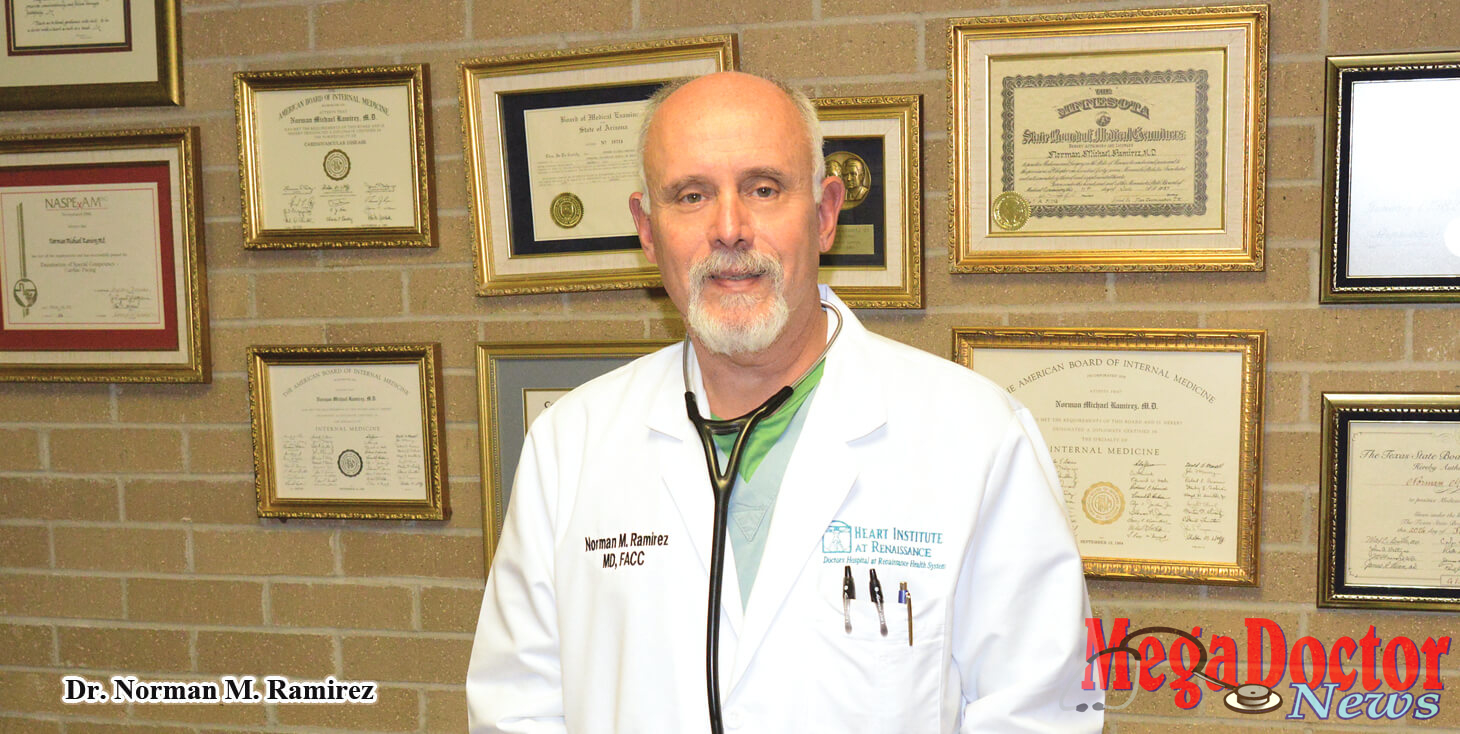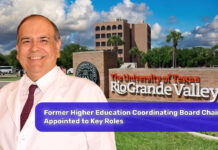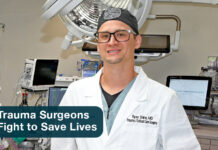His trainings in cardiology and internal medicine have saved hundreds of lives in a journey spanning over three decades
By Roberto Hugo Gonzalez
As originally published by Mega Doctor News in its newsprint edition September 2017
Norman M. Ramirez, M.D., F.A.C.C. is a recognizable name in medicine. He is an internal medicine and cardiology physician certified by the American Board of Internal Medicine and with a solid background in his specialties. Dr. Ramirez treats adult to geriatric patients with certain cardiovascular diseases at the Heart Institute at Renaissance.
Since an early age, he demonstrated leadership potential as he was always striving to reach a level that only the best can obtain. He is a professional that has proven to be exceptional in the field of medicine.
Ramirez grew up in the very small community of Roma, Texas in Starr County. The 2010 Census reported the population at under ten thousand. He attended high school in Rio Grande City, also in Starr County.
“My father was a doctor there, Dr. Mario Ramirez; he practiced for many, many years. Yeah, that’s my dad,” he said. His father is an icon in medicine and recognized as a pioneer in his industry in the Rio Grande Valley. He passed away on Monday, May 22, 2017, at the age of 91.
Dr. Ramirez said that his father was a definite influence and an inspiration for him, that is why he is a doctor today. “I was exposed to medicine at a very early age.” He said, “We used to go to the hospital with him all the time when I was growing up, including house calls.”
People who knew his father remember him as a doctor for everyone. If the patient or family had no money, no problem; he would see the patient who would leave no money for services provided. Occasionally he received some food such as chicken in payment. “I mean, literally it sounds like a cliché, but it’s true.”
With so much activity in his father’s medical practice, Dr. Norman Ramirez and his brothers used to drive their father to house calls. “We used to spend lots of time in the hospital.”
Dr. Norman Ramirez had a great teacher, his dad, someone who loved him and left a legacy of accomplishments, difficult for many to achieve. Yes, this story is about Dr. Norman Ramirez, however, to understand where the strength came from, it is important to share a bit about his father, Dr. Mario Ramirez, his greatness as a human being and as the professional physician he was.
There is a famous saying in Spanish, “Hijo de tigre, pintito,” (meaning: the apple doesn’t fall far from the tree). In a way, this describes Dr. Norman Ramirez, who at age 12 witnessed his first surgery being performed by his father. In 1973, at 16, he enrolled at Yale University graduating in 1977 Magna Cum Laude in Biology with a Bachelor of the Arts degree. He received one of the highest honors, and he did it while attending one of the best universities in the world. “At the age of 16, it was a little scary, but I tried hard and graduated,” he said.
The same year he enrolled at Stanford University Medical School and graduated as a Doctor of Medicine in only three and a half years. From 1982-83, he trained at the University of Texas Southwestern Medical School Parkland Memorial Hospital & VA Medical Center in Dallas, Texas as a Medical Intern. “I did my internal medicine training there,” Dr. Ramirez stated.
Becoming a doctor is not an easy task. The ingredients needed for this field can break aspiring individuals at the beginning or even at the end of their training. To be a medical doctor, you need to be a compassionate human being, persevering, and dedicated to the profession, someone tenacious, who endures long hours of studying and trainings that last for years. Also, you must have your heart in the right place, because many times you will have to see patients that do not have the means to pay for your medical services.
From 1984-85, he completed a Non-Invasive Cardiology Fellowship at the Duke University Medical Center in Durham, North Carolina. In 1985-86 in the same university, he completed an Invasive Cardiology Fellowship in Clinical Electrophysiological Laboratory training. He participated in projects involving testing of investigational pacemakers and anti-tachycardia devices. He also did research on the use of Percutaneous Transluminal Coronary Angioplasty (PTCA). PTCA is a minimally invasive procedure to open up blocked coronary arteries, allowing blood to circulate unobstructed to the heart muscle. His research included the value of emergency coronary interventions in acute myocardial infarctions (heart attack) during his time in the angioplasty lab at Duke University.
Dr. Ramirez was trained in this field over thirty years ago, yet today Electrophysiology continues to be an important procedure that studies and tests the electrical activity of your heart to find where an arrhythmia (abnormal heartbeat) is coming from. These results can help you and your doctor decide whether you need medicine, a pacemaker, an implantable cardioverter defibrillator (ICD), cardiac ablation, or surgery.
He pointed out to Mega Doctor News, that in 1986-87 he trained in interventional cardiology, angioplasties, and stents in a fellowship called Invasive Cardiology Fellowship on Coronary Angioplasty. According to Dr. Ramirez, all of these techniques in medicine were just starting; today they are some of the biggest parts of cardiology.
“1987-89, I joined the Mayo Clinic and was on the staff for two years both in Minnesota and in Arizona.” He continued, “the first year as a Clinical Instructor in Medicine and the second year as a Consultant in Cardiology.” In 1988, he passed what is called a NASPE exam, which is the pacing electrophysiology exam; it was only the second year they gave it.
In 1989, he decided to come home. “That’s how I ended back here. As you know, I had a lot of family ties and I wanted my kids to be exposed to the culture here.” Dr. Ramirez was right to say that family was a strong attraction to come back to the Valley, the other interest was to bring services that had not been available here before.
He acknowledges that today, there are other electrophysiologists here, but when he returned he was the first and only one. “I implanted the first implantable defibrillator in McAllen and in the Valley in 1989. I’ve continued to work at being one of the best and to be at the forefront of cardiology,” he said.
That said, along with other cardiologists, Dr. Ramirez started the TAVR program, which is the Transcatheter Aortic Valve Replacement. This procedure is when your doctor places the aortic valve entering through the femoral artery (large artery in the groin), called the trans femoral approach; it does not require a surgical incision in the chest.
“I did the first one here, about one a year; since then, I’ve done over 70.” He said, “I try to bring newer services to the Valley. I also did what’s called the first rotational atherectomy in Harlingen in 1992, which uses a tiny rotating cutting blade to open a narrowed artery and improve blood flow to or from the heart.”
So, you are a pioneer in some areas? “Well, there’s a lot of good cardiologists here. There’s a lot of them. So, I don’t hold myself above any of them, but I managed to keep going for nearly 30 years doing those procedures,” he said.
Dr. Ramirez sees a wide variety of adult and geriatric patients, many of them indigents. “I enjoy doing that; my dad did it for many years; it’s part of what we do for sure.” He said, “We never turn a patient away regardless of whether they can pay or not.”
The doctor told us that he sees young adult patients with congenital heart problems, elderly patients with coronary disease, heart valve disease, and patients needing pacemakers or defibrillators. He highlighted there are many diabetic patients, “That’s why cardiologists are so busy here.”
Dr. Ramirez said he feels that the most exciting procedure is this catheter valve replacement. From his point of view, it is very revolutionary. “Patients don’t have to have open heart surgery. They just go in and get a catheter, get the valve replaced and they leave the hospital after one or two days, which is pretty amazing.”
In the Valley, there are other cardiologists doing this procedure, but he stated he has perform most of them. As an example, he had a very active 99-year old patient who couldn’t walk because she was short of breath, yet she was still driving. Nobody wanted to operate on her at that age, so he went in, placed the catheter, replaced the valve, and she went home within two days feeling much, much better. “She celebrated her 100th birthday the week after we did the procedure,” he said.
Dr. Ramirez gets more excited just to know that people do not have to travel to Houston and seek this type of procedures. His training is extensive and excellent, probably better than most of the people that are practicing in Houston.
Readers of Mega Doctor News might be surprised to know that Dr. Ramirez was born in Tokyo, Japan. His father was drafted into the Air Force and while serving, he was stationed in Tokyo, Japan for three years. He said, “I was born in Tokyo, but then I grew up in Roma.” When he was 11 months old, his parents came back to the Valley. He went back to Tokyo once with his parents, Dr. Mario and Sarah Aycock Ramirez. Her mother is originally from Louisiana. “My mom and dad met when he was in training as an intern in Louisiana, and she was a nurse.”
For those who are thinking of becoming vegetarians, Dr. Ramirez has been one for the last 30 years. He is also proud to say that he is a runner, “I have participated in four 26-mile-marathons and in multiple half-marathons; I lead by example,” he stated. He used to run with two federal judges, one of them is his cousin Ricardo Hinojosa, the United States District Judge for the Southern District. Do you get together with Judge Hinojosa? “Oh, yeah. We see each other all the time. I saw him last night, in fact, for dinner. He’s more like a brother than a cousin. We see him all the time.”
The other challenging part of being a physician is the responsibility of taking care of the patients. Dr. Ramirez’ day starts at 4:30 in the morning in the hospital. At 7 a.m., he starts surgeries and by 10 a.m. he is at his practice office seeing patients until 6 p.m. and 7 p.m. sometimes.
“So, my hours are long, but it’s always exciting and I love it.” He said, “For some reason I always liked cardiology; I always wanted to do that.” Dr. Ramirez said that when he started his practice here, stents were just being developed and they revolutionized medicine. “Pacemakers were huge; defibrillators were huge; but a lot of things have changed.”
“It is hard to say what is coming in the future. I think doing the valve replacement without having to do open heart is going to be revolutionary. Right now, there are only a few patients that we consider high risk, but I think before long it’s going to be the standard.”
Today, doctors can replace aortic valves without opening the chest, but he says they can do only one. There are three more heart valves that the industry is trying to figure out how to fix without having to do open heart surgery.
The other big question, he says, is heart failure. “There’s already implantable Left Ventricular Assist Devices, what we call LVADs, where you go in and it’s kind of an artificial heart that patients live with for a while. I think those are going to become more the mainstream in the near future. I love practicing cardiology,” he concluded.
Dr. Ramirez treats adult and geriatric patients in his practice at Renaissance Cardiology Group, d.b.a. Heart Institute at Renaissance located at 100 E. Ridge Road, Suite A, in McAllen, Texas 78503. He can be reached at (956) 682-1888.
Dr. Norman M. Ramirez was selected to be our Mega Doctor this month, because for years, he has served this area practicing procedures that have saved many lives. His training, skills and the responsible manner that he applies to his profession set him apart to be recognized among the best in his field.




















